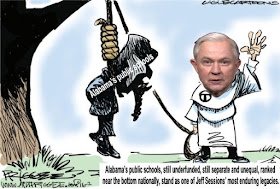Historian Assesses Attorney General Nominee, Jeff Sessions’ Civil Rights Legacy

In case you missed it over the holiday weekend and amidst all the press about President-elect Donald Trump’s nomination of Betsy DeVos as Secretary of Education, you might want to check out Thomas Sugrue’s column about Jeff Sessions.
Thomas Sugrue, a 20th century urban historian, won the Bancroft Prize in American History in 1998 for The Origins of the Urban Crisis: Race and Inequality in Postwar Detroit. A passage from Sugrue’s preface to the book’s 2005 Classic Edition demonstrates the depth of Sugrue’s grasp of the role of race and inequality—subjects deeply connected to the rise of Donald Trump and to Jeff Sessions, about whom Sugrue will tell us more in a few moments.
Sugrue’s specialty is race and inequality in the North. In The Origins of the Urban Crisis, he explains: “Despite more than half a century of civil rights activism and changing racial attitudes, American cities (particularly the old industrial centers of the Northeast and Midwest) remain deeply divided by race. Poverty rates among people of color in major American cities are staggeringly high. Vast tracts of urban land lie pockmarked with boarded-up buildings, abandoned houses, and rubble-strewn lots. At the same time, hundreds of thousands of acres of marshland, meadow, farm, and forest on the periphery of major metropolitan areas get gobbled up each year for vast tracts of new housing, shopping malls, and office parks. City governments struggle with shrinking tax bases and ever-increasing demands on public services, while wealthy suburban municipalities enjoy strong property tax revenues, excellent public services, and superb schools.” Sugrue defines three forces whose “combined effect… reshaped American cities in ways that still affect us today. First was the flight of jobs, particularly the relatively well-paying secure, and mostly unionized industrial jobs that dominated the postwar urban economy. Second was the persistence of workplace discrimination despite remarkable legal and political gains accomplished by the struggle for black civil rights. The third was intractable racial segregation in housing, segregation that led to the uneven distribution of power and resources in metropolitan areas, leaving some places behind while others thrived.” (The Origins of the Urban Crisis, pp. xvii-xviii)
While Donald Trump directed his campaign to mostly white small town and rural voters, the inequality and racial divisions Sugrue describes constitute the foundation for much of the resentment to which Trump appealed—including bitterness in and around metropolitan Rustbelt cities. The bigotry and anger the campaign encouraged created an opening for Trump to nominate a Southern racist to enforce our civil rights laws as Attorney General.
In last week’s column, Sugrue reminds us that Jeff Sessions was nominated by Ronald Reagan as a federal judge, although Sessions was eventually denied confirmation: “In 1986, the Republican-dominated Senate Judiciary Committee torpedoed Ronald Reagan’s nomination of Jeff Sessions to the federal bench. As sworn testimony there revealed, Mr. Sessions, then the United States attorney for the Southern District of Alabama, had referred to the NAACP and Historian Assesses Attorney General Nominee, Jeff Sessions’ Civil Rights Legacy | janresseger:
